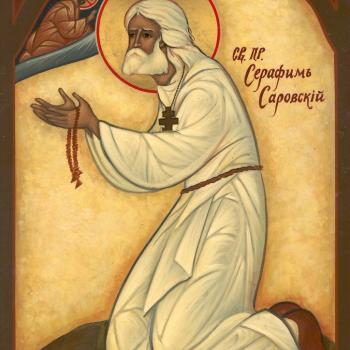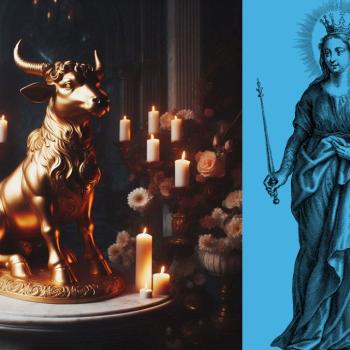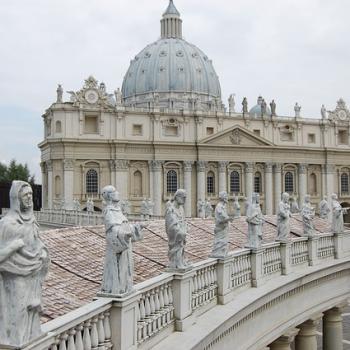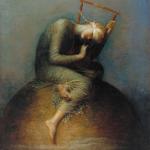
We got through another first week and a half of July.
It’s never easy, if you’re Catholic and if you’ve been a victim of any abuse, particularly rape.
I joked online that the Feast of Saint Maria Goretti is more of an octave, a whole long festival of insensitive people saying horrible things to blame and re-traumatize those who have been the victims of sexual violence for several days. You see it everywhere. I wish I could unplug the computer and go live in the woods for a week every year until it’s over.
A commentator jokingly referred to Goretti’s feast day as “the feast of the intact,” and I love it. I’m going to call it that from now on.
Yesterday I kept thinking about a conversation I had with a nasty relative, when Rosie was a baby.
It took me a full month of flashbacks and daily panic to admit that my botched, abusive childbirth had also involved rape, but once I realized it I couldn’t get it out of my head. I lost my temper one day and named the rapist on Facebook. One of my relatives, who was a nurse, inboxed me. She flatly informed me, “you weren’t raped.” Then she went into several details about my childbirth which were news to me: they were nothing like what had actually happened. She claimed I’d been in a hospital before the emergency c-section instead of attempting a homebirth, for example, and that the rapist was an OB-gyn. At the end of her monologue, she chided me that it’s important not to claim I was raped because I might ruin my rapist’s reputation. She didn’t know my rapist, she just didn’t like to have a total stranger’s reputation ruined because of her hysterical niece. She hadn’t been present at my childbirth, she just heard about it third-hand, and presumed that made her an expert.
She said, “Pray for for prudence, justice, fortitude… the Holy Spirit will grant them if you ask.” As I recall, she even ended the message with “Love you, Mare.” My family often calls me Mare. I have despised that nickname and told them so since I was a little girl. I know it’s a common nickname for “Mary,” but I hate it. They like to fat-shame and I didn’t like being compared to a horse. I told them this, but they didn’t stop.
I corrected Aunt Nurse about my childbirth as patiently as I could. She didn’t exactly apologize, but she said “I didn’t know that. I heard you had a section.”
I haven’t thought of that bizarre dialogue for nearly a decade, but it ran through my head like a freight train yesterday. It’s been running around in circles like a toy train around a Christmas tree ever since.
Why did she respond like that to my saying I’d been raped? Besides the fact that some nurses think they know everything, I mean?
She wasn’t the only one. I had a friend in those days, who often went on walks with me and our strollers because we had babies near the same age. When I told her I’d been raped, she immediately told me that I hadn’t been because this and that criterion hadn’t been met. The rapist hadn’t had a sexual desire, as if that mattered. I started avoiding that friend, but I never quite had the courage to tell her why. And when I’ve talked with other people who have been raped, they tell similar stories: everyone they thought they could trust immediately goes into denial. They don’t believe you. They either assume you’re lying or crazy, or that you brought it on yourself somehow. Those are the only possible explanations. You couldn’t possibly just be who you are and still get raped.
Why is the first thing that happens when you’re raped, that people refuse to believe you and rush in to tell you what actually happened?
Why are they desperate to find a reason why it wasn’t rape?
Why have we as a culture spent so much time glorifying the virtue of people who fight the rapist off, even if it costs them their lives, and assuming that rape victims did something to merit it?
And then it hit me: is this why people insist that Maria Goretti’s sanctity wasn’t in enduring suffering patiently and forgiving her abuser, but in the fact that she was so virtuous, she managed to die without being penetrated? Her skin penetrated with an awl, yes, but not another part penetrated with anything else? Impossible. She was a good girl. Such a good girl that she protected herself from the ultimate dishonor, at the cost of her life. Is that whole line of thought a form of denial?
Is this why victims of sexual violence are told over and over again that they must have been asking for it or it never would have happened? Or if they clearly weren’t asking for it, that it wasn’t so bad or that they made it up for attention?
Is that why I got accused of blasphemy for pointing out that Roman crucifixions involved sexual humiliation and often involved rape, meaning Jesus was certainly sexually abused and likely a rape victim?
Have normies really convinced themselves that sexual violence is something that can’t happen to you if you’re good?
Do they go around telling themselves that if only they’re virtuous enough, they’ll be spared that humiliation and trauma? Something else terrible might happen, but not that? That particular trauma is a punishment for being bad?
I think they do.
I think they have a whole feast day to celebrate a little girl who happened to not get raped, while she was being abused to death by a pervert, so that they can congratulate themselves on not being raped, and so that they can pretend that not being raped is a prize you earn through virtue.
The cowards need a whole Feast of the Intact to assure themselves it’s not going to happen to them, as long as they behave.
They think you can deflect misfortune by being good.
They revere the Mother of Sorrows, who never sinned but had a lifetime of trauma and suffering anyway. They have pictures in their house of Christ crowned with thorns. They read hagiographies of martyrs who got their breasts chopped off, but they’re still in denial. They are so in denial that they hold up a young girl who was sexually harassed, traumatized and threatened for a year before being stabbed and dying by inches, and still tell themselves it’s a story about a girl who won the prize of dying intact because she was chaste.
You could almost feel sorry for them.
I hope we all know better.
I hope we all realize that anything can happen to anyone in life, and this was not our fault. I hope we can see in Christ a fellow victim, someone who suffered blamelessly at the hands of somebody else and who promises empathy and healing, who crowns us with dignity because we are dignified even though our abusers didn’t see us that way. Not someone who hands you a martyr’s crown as a prize for not being the wrong kind of victim who was abused in the wrong way. And I hope we remain firm in that knowledge when told we mustn’t.
They have the Feast of the Intact, and we have the Divine Victim who believes us.
We can let him sort this terrible world out.
Image via Pixabay
Mary Pezzulo is the author of Meditations on the Way of the Cross and Stumbling into Grace: How We Meet God in Tiny Works of Mercy.
Steel Magnificat operates almost entirely on tips. To tip the author, visit our donate page.

















